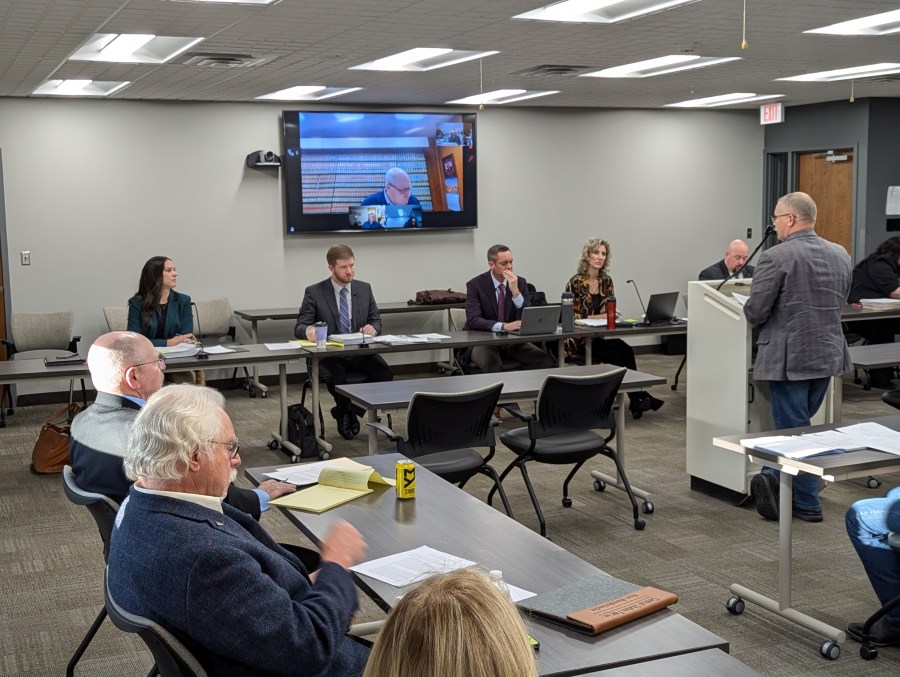PIERRE, S.D. (KELO) — The Pennington County Commission violated several of South Dakota’s open-meeting laws last year, according to a state panel.
The South Dakota Open Meetings Commission on Monday found that the Pennington County Commission broke the executive session exemption when it discussed a wage request from the highway superintendent that was opposed by the county human resources director.
The state commission voted 4-1 that a violation occurred.
The state commission also found that the Pennington County Commission violated another portion of the open-meetings laws by formally voting, 3-2, in public session to turn down the highway superintendent’s request.
The state commission voted 5-0 that a violation occurred because the highway superintendent’s salary wasn’t listed on the meeting agenda.
Two members of the Pennington County Commission, Travis Lasseter and Deb Hadcock, brought the complaint.
The Pennington County Commission will be punished with a public reprimand.
Five state’s attorneys comprise the state commission. Turner County State’s Attorney Katelynn Hoffman said wages aren’t one of the purposes that state law says are appropriate for a public board to discuss in executive session.
Pennington County highway superintendent Joe Miller made a written request seeking wage adjustments for his assistant superintendent and himself, while the county’s human resources director, Carol Bancroft, opposed the increases. The county commission received those documents beforehand and then considered them in executive session as part of Miller’s performance review.
State law doesn’t allow discussion of wages in executive session, according to Hoffman. “They became at fault when they allowed the behavior,” she said.
The county commissioners then voted down the superintendent’s request in public session. The state commission found that action was also a violation because the item hadn’t been on the agenda.
The state commission however found 5-0 that the Pennington County Commission didn’t violate state open-meetings laws when the direction was given in executive session to the human resources director to conduct a government-wide wage analysis.
In other action Monday morning, the state commission found that:
— The Carlyle Township Board of Supervisors in Beadle County failed to post an agenda in advance of a meeting last October. The vote was 5-0 that a violation occurred. Terry Koerner and Todd Koerner filed the complaint.
— The Sturgis City Council violated executive session law by going into executive session on May 6, 2024, without stating a purpose and on February 16, 2024, when the council improperly considered in executive session whether to hire a city manager or a city administrator. The votes were 5-0 that violations occurred. Tammy Bohn filed the complaint.
— The Lead city council didn’t violate open meeting laws when it voted to support legislation for a community center and authorized a city employee to travel to Pierre to lobby for it. The vote was 5-0 that a violation didn’t occur. Gordon Phillips filed the complaint, arguing that the agenda item, labeled “Community Center Update,” didn’t notify the public that a vote would be taken.
— The Charles Mix County Commission failed to post an agenda in advance of its May 23, 2024, meeting. The vote was 5-0 that a violation occurred. Jeff and Jolene Stewart filed the complaint.
— The Tripp City Council failed to post an agenda in advance of a special meeting where the resignation of the police chief was accepted. City attorney Mike Fink acknowledged that an error occurred and said the vote was re-taken at the next meeting. “And I don’t think this is going to happen again,” Fink said. The vote was 5-0 that a violation occurred.
— The Green Valley Sanitary District complaint was deferred for more research, after the state commission members couldn’t find a requirement in state law that a sanitary district must vote at an official public meeting in order to take action. Steve Myers filed the complaint after three trustees obtained a $200,000 loan for the district without taking formal action at a public meeting. The district’s attorney, Erica Olson, argued on Monday that open-meetings laws don’t apply to sanitary districts.
The commission discussed possible dates for the next meeting but didn’t reach a decision.


